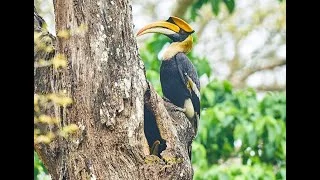

Screengrab from the video.
<p>
Indian Forest Service officer Parveen Kaswan has shared a video on Twitter showing a male Great Hornbill feeding his female partner in a nest in the cavity of a tree, something which he will continue to do for the next three to four months.</p>
<blockquote class="twitter-tweet">
<p dir="ltr" lang="en">
The most beautiful thing you will watch today. Great <a href="https://twitter.com/hashtag/Hornbill?src=hash&amp;ref_src=twsrc%5Etfw">#Hornbill</a> male is feeding the female who has locked her inside nest. This he will do for months !! <a href="https://t.co/t42P2cvgz2">pic.twitter.com/t42P2cvgz2</a></p>
&mdash; Parveen Kaswan, IFS (@ParveenKaswan) <a href="https://twitter.com/ParveenKaswan/status/1522130965317189637?ref_src=twsrc%5Etfw">May 5, 2022</a></blockquote>
<script async src="https://platform.twitter.com/widgets.js" charset="utf-8"></script><p>
Kaswan noted that hornbills are generally monogamous and known for their fidelity to partners.&nbsp;</p>
<p>
The female hornbill will then stay inside the nest for the next three to four months while hatching her eggs and raising the offspring. The male hornbill collects food and feeds the female during this period.</p>
<p>
All but two species of hornbills nest in tree cavities or rock crevasses that are sealed shut except for a narrow, vertical slit. The slit is about a half inch wide: wide enough to pass food through but narrow enough to seal out potential predators such monkeys, raptors and other predators that feed on eggs and young birds. If a snake tries to slither into the nest the female inside can fight it off with her bill.</p>
<p>
Hornbills are found in tropical rain forests such as India and the birds are named after their large horn-like bills found on most species which can reach up to 13 inches in length.</p>
<p>
Hornbills primarily feed on fruit, figs and insects. Many species collect fruit in their neck pouch and hide them in caches. Some have the ability to clasp fruit, insects and other food with the tip of their bill and deftly toss it in the air and catch it in their gullet like a person catching a piece of popcorn in their mouth. As a rule hornbills don&rsquo;t drink. They get all the water they need from their food. Only four species have ever been observed drinking water.</p>
<p>
<strong>Also read: <a href="https://www.indianarrative.com/science-news/odisha-s-chilka-lagoon-stuns-bird-watchers-becomes-the-only-place-in-the-world-to-host-white-grayheaded-swamphen-168832.html">Odisha &#39;s Chilka lagoon stuns bird watchers – becomes the only place in the world to host white grayheaded swamphen</a></strong></p>
Sub Lieutenant Astha Poonia officially became the first woman to be streamed into the fighter…
As Israel awaits Hamas's response on Friday to the latest proposal for a hostage release…
Deputy Chief of Army Staff (Capability Development and Sustenance), Lieutenant General Rahul R Singh, on…
A report on Bangladesh's media landscape has revealed that the restrictive laws and political press…
Prime Minister Narendra Modi has said that India is actively working on creating a comprehensive…
The Indian Chamber of Commerce (ICC) on Thursday hosted the 14th India Minerals and Metals…